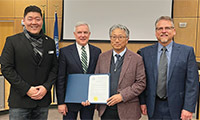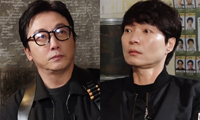It wasn’t too long ago when a first generation Korean American woman approached the Rev. Kum Ji Hwang to discuss what she saw as an unfair situation. The woman felt the landlord of her 20-unit apartment building was taking advantage of her limited English-language skills.
"The manager was (fumigating) the building for termites," says Rev. Hwang, who is the director of the 4.29 Center, "so all the tenants had to evacuate for three days. He went to his Hispanic (and non-Korean) tenants and told them he would pay for hotel rooms they could stay in during that time. Then, he went to his Korean tenants and told them they had to find their own place to stay."
To Hwang, this was clearly an instance of a landlord benefiting at the expense of his Korean tenants. After contacting the errant landlord and the Housing Department, the situation was resolved with each of the Korean tenants being compensated for their hotel stay as well. The irony was that the landlord was not White, Black or Hispanic. He was also a first generation Korean American.
Hwang uses this example to illustrate a number of points, the most important being that, despite what the media or the public at large might perceive, the bulk of the conflicts she deals with these days has very little to do with Blacks and Koreans.
"Of course, there are still problems between the Black and Korean communities and between liquor store owners and their customers," she says, "but most of the conflicts we’re called on to mediate involve landlords and tenants, or Koreans and Latinos. Yet the media still focuses on the so-called Black-Korean conflict (as in a recent LA Times Magazine article which once again pulled up the Soon Ja Du-Latasha Harlins as an example of strained relationships between these two communities). There needs to be more media responsibility."
Responsibility was what brought Rev. Hwang to Los Angeles and the 4.29 Center. In 1990, she started serving in the Illinois Great Rivers Conference of the United Methodist Church. Although she felt support from the other 800 ministers in the conference, she also felt a keen sense of isolation. There were very few ethnic minorities who were her peers and the agenda was too conservative for Hwang’s views. So she decided to move out to California, unsure of her specific plans, but positive that her calling was to help other Koreans who were struggling to find a voice and community in America.
"I think the problems of first generation Koreans are different from those of the second generation," she explains. "It’s a difficult struggle for them to learn English and to try to learn about this new culture. The pain I see inside these Koreans is very deep, and to see them mistreated or misunderstood by English-speakers, including second generation Korean Americans, fills me with pain."
Upon arriving in Los Angeles, Hwang started attending both Black and Korean churches (a practice she still continues today) in an effort to understand both communities and their problems. Then in early 2000, she happened upon an article in the Korea Times about the different forms of discrimination faced by Korean Americans which included comments from Charles Kim of the Korean American Coalition (KAC). She was impressed by Kim’s interview and decided to call him.
"My timing was perfect," Hwang recalls. "At that moment, Charles was looking for someone to hire to coordinate an educational program on ‘anti-discrimination in the workplace’ which KAC had received a grant from the Department of Justice to (undertake). Then, three months later, the position of director for the 4.29 Center became available and I moved over there."
The 4.29 Center, which is a project of the KAC and housed in its offices, was established in 1997, in collaboration with the Martin Luther King Legacy Association, to provide alternative means for resolving disputes between inner-city merchants and local residents, and to strengthen interethnic relationships through mediation, education and outreach programs. Funding came from the Los Angeles County Dispute Resolution Program and the Korea Society.
Examples of the programs the 4.29 Center has initiated include a mediation training programs where 70 leaders of various ethnicities and communities are taught the skills to peacefully resolve conflicts to an educational workshop for landlords in economically lower class Korean and Hispanic neighborhoods to help improve building conditions and relationships with their tenants. But the center’s most ambitious project was a merchant survey of grocery and liquor stores in South Central Los Angeles.
For a six month period last year, Rev. Hwang and her part-time staff of three surveyed 112 grocery and liquor store owners and visited almost 350 of these businesses to assess current attitudes regarding Black-Korean and Korean-Hispanic relationships. Most of the merchants were Korean Americans and the majority of their customers were either Black (40%) or Hispanic (50%). The results were made public last October. Among the conclusions, Hwang reached from the survey:
Over 50 percent of the respondents had an understanding of Black and Hispanic culture or history. Eighty-eight percent of respondents said they had a good relationship with their local communities. Thirty percent of these merchants who stated they had good relationships said the reason for this was because they owned their businesses for a long span of time. Fifty-eight percent said it was because they were making more of an effort to be "kind" toward their customers. Overall, Korean American merchants who had owned their businesses longer had better relationships with their customers, while more recently arrived immigrant business owners had more difficulties.
Based on the survey and her experiences speaking with the merchants as well as the residents of these communities, Hwang concluded that racial conflicts between Black and Koreans are actually rare. However, there are still examples of problems between individual merchants and customers which are not necessarily rooted in racial conflicts. Most of the merchants felt the bigger problem came from L.A. County officials and what they felt were efforts by politicians to squeeze out their businesses by creating restrictive policies for their liquor stores.
"But the media is still responsible for focusing primarily on Black-Korean conflicts," Hwang says. With more Hispanics and Koreans living and working in close proximity, she feels this is an area where more work needs to be done. Hwang is currently working to educate Korean business owners, many of whom employ low-wage Hispanic workers, to better relationships between the two.
Still, with the tenth anniversary of the L.A. Riots looming just around the corner, Hwang is striving to make sure her center will be actively involved in programs to commemorate the anniversary. She has been speaking with different community agencies and hopes to help put several programs in place for next year including a voter registration drive, educational programs, a mural painting project and a photo/video exhibition looking back on the events of April 29, 1992.
Hwang is involved in on-going dialogues with Black ministers, and her center shares resources with the Martin Luther King Dispute Resolution Center and the two groups are planning a joint mediator training program for next year. She is also trying to develop better relationships with Hispanic organizations and has even recommended Hispnic applicants for the Korean Heritage Scholarship.
But being a non-profit organization, the 4.29 Center’s resources are limited. The center operates on a $100,000 budget which is funded by the county and KAC with each contributing half of the center’s yearly budget. The budget pays for Hwang’s salary as well as that of three part-time staff, office rental/expenses and all the center’s programs.
But despite the obstacles, Hwang doesn’t see an end to her struggle to serve and help the Korean American community. And she sees hope for a better future.
"A Korean reporter asked me once-’how can we prevent another riot?’" Hwang remembers. "And I answered ‘through love.’ We have to try to love one another more. I really don’t have a better answer. But that’s where we need to start if we really want to solve these problems."
스마터리빙
more [ 건강]
[ 건강]이제 혈관 건강도 챙기자!
[현대해운]우리 눈에 보이지 않기 때문에 혈관 건강을 챙기는 것은 결코 쉽지 않은데요. 여러분은 혈관 건강을 유지하기 위해 어떤 노력을 하시나요?
 [ 건강]
[ 건강]내 몸이 건강해지는 과일궁합
 [ 라이프]
[ 라이프]벌레야 물럿거라! 천연 해충제 만들기
 [ 건강]
[ 건강]혈압 낮추는데 좋은 식품
[현대해운]혈관 건강은 주로 노화가 진행되면서 지켜야 할 문제라고 인식되어 왔습니다. 최근 생활 패턴과 식생활의 변화로 혈관의 노화 진행이 빨라지고
사람·사람들
more
[한인단체 신년 인터뷰] LA 평통 장병우 회장… “본연 역할로 한반도 평화 실질 기여”
민주평화통일자문회의 LA협의회(이하 LA 평통) 장병우 회장은 6일 본보와의 신년 인터뷰에서 붉은 말의 해인 병오년 새해를 맞아 신년 화두로 …

워싱턴주에 첫 한인 시의장
워싱턴주에서 첫 한인 시의회 의장이 탄생했다. 제이슨 문(한국명 문태원) 머킬티오 시의원이 새해 들어 시의장으로 선출되며 또 하나의 중책을 맡…
국회 방문단 대한인국민회 방문
윤후덕·이해식·김한규 의원과 조오섭 국회의장 비서실장 등 10여 명의 한국 국회방문단이 지난 5일 LA를 찾아 로즈데일 묘지와 국민회관 등 미…
[한인단체 신년 인터뷰] 명원식 파바월드 회장… …
“한인 차세대들이 바르게 자랄 수 있는 토대를 만드는 것이 제가 파바월드의 회장으로 존재하는 유일한 이유입니다”한인사회의 대표적 청소년 봉사 …
LA한인회 멘토 프로그램 10일 스티브 강 위원장
LA 한인회(회장 로버트 안)가 한인사회 차세대 인재양성 노력의 하나로 ‘멘토를 만나다’ 프로그램을 정례화해 실시하고 있는 가운데 그 세 번째…
많이 본 기사
- 머스크, 韓인구절벽 또 경고… “북한군 그냥 걸어 넘어오면 돼”
- 구글 공동창업자도 오라클 회장도…탈캘리포니아?
- 덴마크·그린란드, 美 ‘그린란드 회담’ 수락에 “환영”
- 연예계 은퇴합니다..돌연 충격 선언한 조윤우·소희·이태임
- 트럼프, ‘美 베네수 운영 관여 1년 넘나’ 묻자 “훨씬 더 길 것”
- 젤렌스키 “美 우크라 안전보장안, 트럼프 결정만 남아”
- ICE 요원 총격… 시민권자 여성 사… 4
- [스키 기고] 초보자의 수난과 고수의 허세
- “공업용 실리콘을 얼굴에”..故 선풍기 아줌마, 충격적인 성형 부작용[꼬꼬무]
- 내란특검, 尹 구형 숙고 6시간 ‘마라톤 회의’…키는 조은석 손에
- 탁재훈·신정환, 드디어 컨츄리꼬꼬 재회.. “또 잡힌 겁니까?”[노빠꾸]
- 트럼프 관세에 美 무역적자 16년만에 최소…의약품 수입 금감
- 초강경 이민단속, 아시아계도 큰 타격 3
- ‘美 정복’ 손흥민, 케인·메시·음바페와 어깨 나란히... ‘올해의 팀’ 공격수 부문 후보 등극
- 美, 인천에 본부 둔 녹색기후기금 탈퇴… “자금지원 안해”
- ICE Agent Shooting Sparks Outrage: U.S. Citizen Woman Killed
- 케빈 김 주한 미 대사대리 전격 이임
- ‘오타니·야마모토’ 때문에 日 못 뚫는 SF, ‘이정후 파워’로 한국 개척 나선다... 일본도 주목 중
- 유엔기후협약, 美 탈퇴에 “자책골…재가입문 열려있어”
- 초강경 이민단속, 아시안 커뮤니티도 큰 타격
- 이주자 텍사스 몰린다 가주는 유입자 최하위
- 팰팍 타운 77만달러 적자 놓고 정치권‘충돌’
- ‘데이트 폭력 폭로’ 재키와이, 돌연 입 열었다 “흉기·스토킹 NO”
- 美, ‘외국산 드론·부품 수입 금지’ 예외 허용…삼성 제품 포함
- 軍권력기관 방첩사, 계엄 여파로 49년 만에 역사 속으로
- 李대통령 “에너지 문제로 국제 혼란…에너지대전환 잘 준비해야”
- [발언대] L.A. 갈비의 유래
- 브로드웨이 뮤지컬 공연을 반값에…
- “모든 소송 철회하고 내분사태 원만히 해결하길”
- 마크롱 “美, 일부 동맹국에 등 돌리고 국제규범서 벗어나”
- 부고-박철환 씨 별세
- LAX 무인열차 6월엔 개통되나
- 뉴욕 등 5개주 연방아동보육예산 지원 전격 중단
- 제5대 회장에 김길영 회장 연임
- “주택 부족, 워싱턴 경제 위험 초래”
- 42억 횡령→징역형 집유 받았는데도..황정음 소속사 여전히 미등록
- D-SNP 한인 가입자들, 그로서리 혜택 놓친다
- 가주 등 5개주 연방 아동보육 예산 전격 동결
- MD 몽고메리서 음주운전자 140여명 적발
- ‘故안재환과 사별’ 정선희, 재혼 질문에 솔직 답변 “국내에선 의향 없어”
- 韓 여야, 이혜훈 청문회 19일 하루 잠정 합의… “충분히 질의”
- 2026년은?
- 한인 제이슨 문, 머킬티오 시의장됐다...5일 첫 회의 주재한 가운데 ‘한인의 날’지지 선언문 채택
- 형제교회 올해도 1만달러 ...꿈나눔북클럽 2,000달러, 시애틀진보연대 500달러
- ‘연방 하원 민주·상원 공화’가능성 커
- [신년 집중기획/ 변모하는 한인타운] K-컬처 중심으로… 면모·체질 ‘업그레이드’ 원년
- [독자 투고] 땅 끝 마을 파타고니아… 2
- 아펜젤러 한국선교 140주년 기념 미주 순회공연
- ‘맥립’에 갈비고기 없다 맥도널드 허위광고 소송
- LA 한인회, 새해 맞아 양로병원 어르신들께 ‘새배’
1/5지식톡

-
 미 육군 사관학교 West Poin…
0
미 육군 사관학교 West Poin…
0https://youtu.be/SxD8cEhNV6Q연락처:wpkapca@gmail.comJohn Choi: 714-716-6414West Point 합격증을 받으셨나요?미 육군사관학교 West Point 학부모 모…
-
 ☝️해외에서도 가능한 한국어 선생님…
0
☝️해외에서도 가능한 한국어 선생님…
0이 영상 하나면 충분합니다!♥️상담신청문의♥️☝️ 문의 폭주로 '선착순 상담'만 진행합니다.☎️ : 02-6213-9094✨카카오톡ID : @GOODEDU77 (@골뱅이 꼭 붙여주셔야합니다…
-
 테슬라 자동차 시트커버 장착
0
테슬라 자동차 시트커버 장착
0테슬라 시트커버, 사놓고 아직 못 씌우셨죠?장착이 생각보다 쉽지 않습니다.20년 경력 전문가에게 맡기세요 — 깔끔하고 딱 맞게 장착해드립니다!장착비용:앞좌석: $40뒷좌석: $60앞·뒷좌석 …
-
 식당용 부탄가스
0
식당용 부탄가스
0식당용 부탄가스 홀세일 합니다 로스앤젤레스 다운타운 픽업 가능 안녕 하세요?강아지 & 고양이 모든 애완동물 / 반려동물 식품 & 모든 애완동물/반려동물 관련 제품들 전문적으로 홀세일/취급하는 회사 입니다 100% …
-
 ACSL 국제 컴퓨터 과학 대회, …
0
ACSL 국제 컴퓨터 과학 대회, …
0웹사이트 : www.eduspot.co.kr 카카오톡 상담하기 : https://pf.kakao.com/_BEQWxb블로그 : https://blog.naver.com/eduspotmain안녕하세요, 에듀스팟입니다…
케이타운 1번가
오피니언
 이상희 UC 리버사이드 교수 인류학
이상희 UC 리버사이드 교수 인류학 오렌지 상자와 함께하는 2026년
 오세정 서울대 물리천문학부 명예교수·전 총장
오세정 서울대 물리천문학부 명예교수·전 총장 [오세정 칼럼] 병오년 새해, 한국의 과제
 존 안 / LA 거주
존 안 / LA 거주 [독자 투고] 땅 끝 마을 파타고니아 여행 유감
 이리나 수필가
이리나 수필가 [윌셔에서] 레디 코어(Ready Core)의 해를 맞으며
 이영창 / 한국일보 논설위원
이영창 / 한국일보 논설위원 [지평선] 67년생 현역 축구선수 미우라

[왈가 왈부] “이혜훈 청문회까지 지켜봐야”… 국민 눈높이에 맞나요
 정숙희 논설위원
정숙희 논설위원케네디에 관한 네 개의 이야기
 마크 A. 시쎈 / 워싱턴포스트 칼럼니스트
마크 A. 시쎈 / 워싱턴포스트 칼럼니스트 [마크 A. 시쎈 칼럼] 트럼프의 20가지 업적
 김동찬 시민참여센터 대표
김동찬 시민참여센터 대표 [미국은 지금] 2026년 ‘손님’ 의식 버리고 ‘주인’ 입장을
1/3지사별 뉴스

팰팍 타운 77만달러 적자 놓고 정치권‘충돌’
뉴저지 팰리세이즈팍 타운정부가 지난해 77만5,000달러 재정적자가 발생한 것을 두고 정치권이 강하게 충돌하면서 지역 한인사회가 술렁이고 있다…
뉴욕 등 5개주 연방아동보육예산 지원 전격 중단

‘연방 하원 민주·상원 공화’가능성 커
올해 11월3일 미 전역에서 중간선거가 실시된다. 이번 선거에서는 연방 하원 전체 435석과 함께 연방 상원 100석 가운데 35석을 새로 선…
“주택 부족, 워싱턴 경제 위험 초래”

베네수 이어 그린란드…트럼프, 2년차 벽두부터 美우선주의 거친 질주
2026년 새해 벽두부터 도널드 트럼프 대통령의 행보가 심상치 않다.집권 2기 2년차를 맞아 자신과 지지층의 이념이라 할 ‘미국 우선주의’ 구…
중부 캘리포니아 ‘한인 이민사’ 나왔다



















































.png)


댓글 안에 당신의 성숙함도 담아 주세요.
'오늘의 한마디'는 기사에 대하여 자신의 생각을 말하고 남의 생각을 들으며 서로 다양한 의견을 나누는 공간입니다. 그러나 간혹 불건전한 내용을 올리시는 분들이 계셔서 건전한 인터넷문화 정착을 위해 아래와 같은 운영원칙을 적용합니다.
자체 모니터링을 통해 아래에 해당하는 내용이 포함된 댓글이 발견되면 예고없이 삭제 조치를 하겠습니다.
불건전한 댓글을 올리거나, 이름에 비속어 및 상대방의 불쾌감을 주는 단어를 사용, 유명인 또는 특정 일반인을 사칭하는 경우 이용에 대한 차단 제재를 받을 수 있습니다. 차단될 경우, 일주일간 댓글을 달수 없게 됩니다.
명예훼손, 개인정보 유출, 욕설 등 법률에 위반되는 댓글은 관계 법령에 의거 민형사상 처벌을 받을 수 있으니 이용에 주의를 부탁드립니다.
Close
x